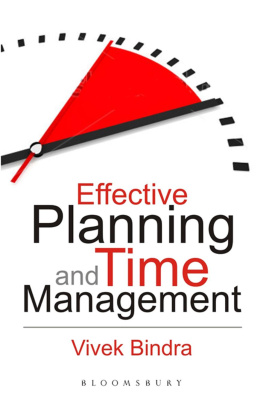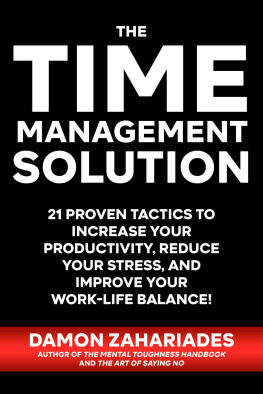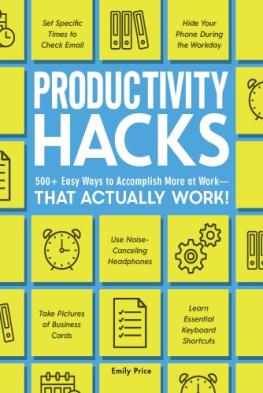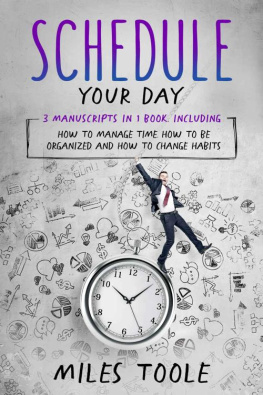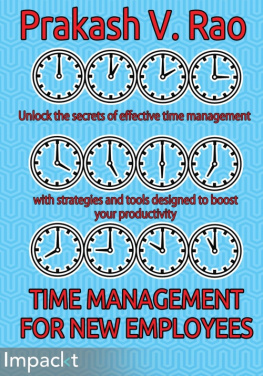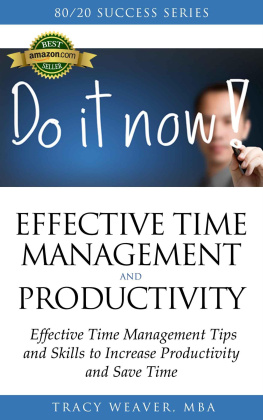Content

Effective Planning and Time Management
Effective Planning and Time Management
VIVEK BINDRA

First published in India 2015
2015 by Vivek Bindra
All rights reserved. No part of this publication may be reproduced or transmitted in any form or by any means, electronic or mechanical, including photocopying, recording, or any information storage or retrieval system, without prior permission in writing from the publishers.
No responsibility for loss caused to any individual or organization acting on or refraining from action as a result of the material in this publication can be accepted by Bloomsbury or the author.
The content of this book is the sole expression and opinion of its author, and not of the publisher. The publisher in no manner is liable for any opinion or views expressed by the author. While best efforts have been made in preparing this book, the publisher makes no representations or warranties of any kind and assumes no liabilities of any kind with respect to the accuracy or completeness of the content and specifically disclaims any implied warranties of merchantability or fitness of use for a particular purpose.
The publisher believes that the content of this book does not violate any existing copyright/intellectual property of others in any manner whatsoever. However, in case any source has not been duly attributed, the publisher may be notified in writing for necessary action.
BLOOMSBURY and the Diana logo are trademarks of Bloomsbury Publishing Plc
E-ISBN 978 93 86250 24 7
Bloomsbury Publishing India Pvt. Ltd
DDA Complex, LSC Building No.4
Second Floor, Pocket C 6 & 7, Vasant Kunj
New Delhi 110070
www.bloomsbury.com
Created by Manipal Digital Systems.
To find out more about our authors and books visit www.bloomsbury.com.
Here you will find extracts, author interviews, details of forthcoming events and the option to sign up for our newsletters.
OFFERED TO
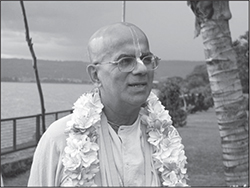
His Holiness Gopal Krishna Goswami Maharaj
I offer this book at the divine lotus feet of my revered spiritual master, His Holiness Gopal Krishna Goswami Maharaj, for his blessings. This book is written under the guidance of my spiritual master who has inspired me in all my writings. I constantly seek his encouragement and inspiration to serve their lordships.
Vivek Bindra
(Venu Madhav Das)
PREFACE
Time management can be simply explained as an organised way of living that connects every activity with the important goals of our life. It is a method to harmonise our work and life and to maintain equilibrium in the achievement of our goals, our actions and our thoughts.
Effective planning and time management lead to order, clarity of purpose and goals, optimum utilisation of resources, and a happier and more successful life.
While writing this book, I had a very clear objective. By applying certain principles, I have been able to regulate my lifestyle and work more efficiently than ever before. I wanted to share this learning with others.
Through the eight chapters in this book, I have attempted to ensure that the readers understand goal setting, the meaning and importance of effective planning and the techniques and tools we can use to effectively plan and manage our time so that we can achieve our goals.
CONTENTS
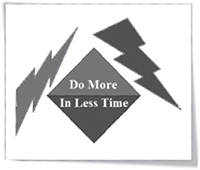
One of the very worst uses of time is to do something very well that need not to be done at all.
Brian Tracy
Conventional wisdom is, if you want to get more things done, you need more time. It makes sense that an individual working for twelve to fourteen hours a day will be more successful in his or her personal and professional endeavours as compared to someone working for just six to seven hours. A student preparing for competitive examinations and studying for ten hours a day is surely more likely to get through than his friend who studies for just four to five hours.
To put it simply, achieving more is directly proportionate to the number of hours put into the effort. Right?
No. My dear friend, you do not need extra hours to become extraordinary. What you need is effective planning and time management, which are the central themes of the book you are reading. The first chapter of this book will help you think creatively on how you can plan so as to accomplish more in less time.
THE SCIENCE OF DOING MORE
Its not just the number of hours we sit at a desk that determines the value we generate. Unknown
Today, we all have become part of the rat race in order to grow personally and professionally. We thrive on productivity and performance. But the problem is, many of us do not understand the science behind doing more in less time. It is not about chaining yourself to your work station, putting in more hours at the office or staying up late at night to complete the task.
It is about understanding the basics of how your brain and body functions.
Today, I will give you basic guidelines that will double your ability to do much more in less time.
Let us start with a short story.
Surabhi is a single mother who is often seen fire-fighting. She has a job, two kids to raise, a house to manage and a lot of other responsibilities. She does not have a social life, has financial burdens and constantly feels like her head will explode! She often wishes a day had thirty-six hours instead of twenty-four.
If you are anywhere like Surabhi, you too want a longer day, a day that has more than twenty-four hours.
Let me start by asking you a few questions:
LEARNING ACTIVITY 1: THINK AND WRITE
- What are the things you do on an average working day?
..............................................................................................
..............................................................................................
..............................................................................................
- What are the problems you are faced with when you run out of time?
..............................................................................................
..............................................................................................
..............................................................................................
- What are the outcomes of these problems?
..............................................................................................
..............................................................................................
..............................................................................................
- List five benefits of managing time for yourself.
..............................................................................................
..............................................................................................
..............................................................................................

